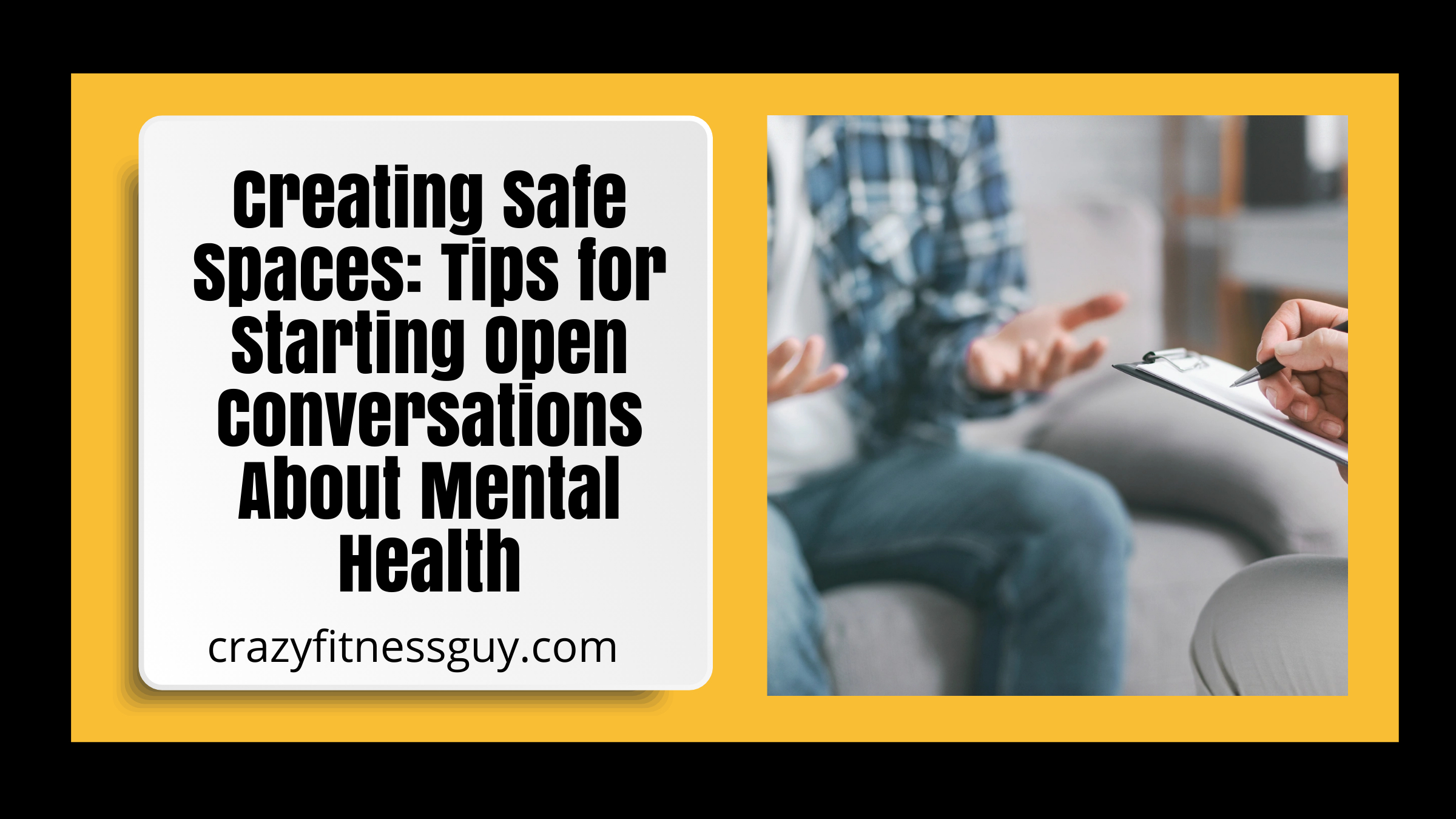Creating Safe Spaces: Tips for Starting Open Conversations About Mental Health

In a world that often prioritizes physical health and external success, mental health can sometimes be overlooked, especially when it comes to men. The stigma surrounding mental health can prevent individuals from seeking help and openly discussing their feelings. This blog post aims to provide practical advice on how to initiate and maintain open conversations about mental health, creating safe and supportive environments where men feel comfortable sharing their experiences without judgment. We'll explore strategies, resources, and insights from wellness experts, drawing from the valuable discussions in our recent podcast episode, "Embracing Vulnerability: A Deep Dive into Men’s Mental Health with Zach and Jeremy from the Fit Mess." This episode featured Zach and Jeremy from The Fit Mess, who shared their personal journeys and insights on turning struggles into a platform for help. We encourage you to listen to the episode for a deeper understanding of the topics discussed here.
Introduction: The Importance of Open Conversations About Men's Mental Health
Mental health is a critical component of overall well-being. Yet, men often face unique challenges in addressing their mental health needs. Societal expectations, traditional gender roles, and the stigma associated with vulnerability can create significant barriers to seeking help. Men are often taught to be strong, independent, and emotionally stoic, which can discourage them from expressing their feelings or admitting when they are struggling.
Open conversations about mental health are essential for breaking down these barriers. By creating a culture where men feel safe and supported to share their experiences, we can reduce stigma, increase awareness, and encourage help-seeking behavior. These conversations can also foster a sense of community and connection, reminding men that they are not alone in their struggles. Starting these conversations might seem daunting, but they are crucial for promoting mental wellness and saving lives.
The consequences of neglecting men's mental health are significant. Men are more likely to die by suicide than women, and they often experience higher rates of substance abuse and other mental health issues. By prioritizing open and honest discussions, we can help men access the support they need and improve their overall quality of life. This blog post aims to equip you with the tools and knowledge to start these vital conversations and create safe spaces for men to share their mental health experiences.
Why Vulnerability is Crucial in Addressing Mental Health
Vulnerability is often seen as a weakness, especially for men. However, it is a fundamental component of human connection and mental well-being. Embracing vulnerability allows individuals to authentically express their feelings, build deeper relationships, and seek support when needed. When men are willing to be vulnerable, they create opportunities for others to do the same, fostering a culture of openness and understanding.
Being vulnerable means allowing oneself to be seen and known, flaws and all. It involves taking the risk of exposing one's emotions and experiences, even when it feels uncomfortable or scary. This can be particularly challenging for men who have been socialized to suppress their emotions and maintain a facade of strength. However, it is through vulnerability that men can truly connect with others, build meaningful relationships, and find the support they need to navigate their mental health challenges.
Vulnerability also plays a crucial role in reducing stigma. When men openly share their struggles, they challenge the societal expectations that dictate they should always be strong and in control. This can inspire others to come forward and seek help, creating a ripple effect of openness and support. By embracing vulnerability, men can break down the barriers that prevent them from accessing mental health care and create a more compassionate and understanding society.
The Fit Mess Podcast: Turning Struggles into a Platform for Help
Zach and Jeremy, the hosts of The Fit Mess podcast, are prime examples of how turning personal struggles into a platform for help can benefit both the individuals and the community. They courageously share their own experiences with mental health challenges, including anxiety, depression, and addiction, creating a safe space for others to do the same.
The Fit Mess podcast focuses on the importance of mental and physical wellness, offering practical advice, expert interviews, and personal anecdotes. Zach and Jeremy's authenticity and vulnerability resonate with their audience, creating a sense of connection and community. They have interviewed numerous wellness experts, sharing valuable insights and strategies for managing mental health.
Their journey demonstrates the power of resilience and the importance of seeking help when needed. By sharing their stories, Zach and Jeremy have inspired countless individuals to take control of their mental health and seek support. They have shown that it is possible to turn personal struggles into a source of strength and inspiration, creating a positive impact on the lives of others. Their work highlights the importance of open conversations and the power of community in addressing mental health challenges.
Practical Tips for Starting Conversations About Feelings
Starting conversations about feelings can be challenging, especially for those who are not used to expressing their emotions. Here are some practical tips to help initiate and maintain open conversations about mental health:
- Choose the Right Time and Place: Pick a time and place where you and the other person feel comfortable and relaxed. Avoid bringing up sensitive topics when you are rushed, stressed, or in a public setting where privacy is limited.
- Start with Small Steps: Begin by sharing your own feelings in a small, manageable way. For example, you could say, "I've been feeling a bit stressed lately," and see how the other person responds. This can help create a sense of safety and encourage them to open up as well.
- Listen Actively: When the other person is talking, focus on listening without interrupting or judging. Show that you are genuinely interested in what they have to say by making eye contact, nodding, and asking clarifying questions.
- Validate Their Feelings: Acknowledge and validate the other person's feelings, even if you don't fully understand them. You could say something like, "That sounds really difficult," or "I can see why you're feeling that way."
- Avoid Giving Unsolicited Advice: Unless the other person specifically asks for advice, focus on listening and providing support. Sometimes, people just need to be heard and understood.
- Be Patient: It may take time for someone to feel comfortable opening up. Be patient and understanding, and let them know that you are there for them whenever they are ready to talk.
- Lead by Example: Share your own experiences with vulnerability and mental health. This can encourage others to do the same and create a sense of mutual support.
- Ask Open-Ended Questions: Instead of asking questions that can be answered with a simple "yes" or "no," ask open-ended questions that encourage the other person to elaborate. For example, instead of asking "Are you okay?" try asking "How have you been feeling lately?"
By following these tips, you can create a safe and supportive environment for open conversations about mental health. Remember, it's not about having all the answers, but about being there for someone and listening with empathy and understanding.
The Role of Therapy and Physical Activity in Mental Health Management
Therapy and physical activity are two powerful tools for managing mental health. Therapy provides a safe and structured environment to explore one's thoughts, feelings, and behaviors, while physical activity offers numerous benefits for both physical and mental well-being.
Therapy can help individuals identify and address the root causes of their mental health challenges. It can also provide them with coping strategies, communication skills, and a greater understanding of themselves. There are many different types of therapy, including cognitive-behavioral therapy (CBT), dialectical behavior therapy (DBT), and interpersonal therapy (IPT), each with its own unique approach and focus. Finding the right type of therapy and therapist can make a significant difference in one's mental health journey.
Physical activity has been shown to have numerous benefits for mental health, including reducing symptoms of anxiety and depression, improving mood, and increasing self-esteem. Exercise releases endorphins, which have mood-boosting effects, and can also help reduce stress and improve sleep. It's not necessary to engage in intense workouts to reap the benefits of physical activity. Even moderate exercise, such as walking, jogging, or swimming, can make a significant difference.
Combining therapy and physical activity can be a powerful strategy for managing mental health. Therapy can help individuals address the underlying issues contributing to their mental health challenges, while physical activity can provide immediate relief from symptoms and improve overall well-being. Integrating both into one's routine can lead to a more balanced and fulfilling life.
Insights from Wellness Experts: Lessons from The Fit Mess Interviews
The Fit Mess podcast has featured numerous interviews with wellness experts, providing valuable insights and strategies for managing mental health. Some key lessons learned from these interviews include:
- The Importance of Self-Care: Taking care of oneself is essential for maintaining mental health. This includes getting enough sleep, eating a healthy diet, engaging in regular physical activity, and practicing mindfulness or meditation.
- The Power of Connection: Building and maintaining strong relationships is crucial for mental well-being. Connecting with others can provide a sense of belonging, support, and purpose.
- The Value of Setting Boundaries: Setting healthy boundaries is essential for protecting one's mental and emotional energy. This includes saying no to commitments that drain you, limiting exposure to negative influences, and prioritizing your own needs.
- The Role of Gratitude: Practicing gratitude can help shift one's focus from what is lacking to what is present. This can improve mood, increase happiness, and foster a sense of appreciation for life.
- The Importance of Seeking Help: Recognizing when you need help and seeking support from a therapist, counselor, or support group is a sign of strength, not weakness. It's important to remember that you don't have to go through your struggles alone.
These insights from wellness experts highlight the importance of taking a holistic approach to mental health, focusing on self-care, connection, boundaries, gratitude, and help-seeking behavior. By incorporating these strategies into your life, you can improve your mental well-being and build resilience in the face of challenges.
Overcoming Societal Expectations and the Stigma Around Men's Mental Health
Societal expectations and the stigma surrounding men's mental health can create significant barriers to seeking help. Men are often taught to be strong, independent, and emotionally stoic, which can discourage them from expressing their feelings or admitting when they are struggling. This can lead to feelings of isolation, shame, and guilt, making it even more difficult to seek support.
Overcoming these barriers requires challenging traditional gender roles and promoting a more inclusive and understanding view of mental health. It's important to recognize that expressing emotions is not a sign of weakness, but rather a sign of strength and self-awareness. Men need to feel empowered to seek help without fear of judgment or ridicule.
Breaking down the stigma around men's mental health also requires education and awareness. By sharing personal stories, promoting open conversations, and challenging harmful stereotypes, we can create a more supportive and understanding society. It's important to remember that mental health challenges are common and treatable, and that seeking help is a sign of courage and self-care.
Creating safe spaces where men feel comfortable sharing their experiences is also crucial. This can include support groups, online forums, or simply having trusted friends or family members to talk to. By creating these spaces, we can help men feel less alone and more empowered to seek the help they need.
Resources and Tools for Continued Support
There are numerous resources and tools available to support men's mental health. Some helpful resources include:
- National Suicide Prevention Lifeline: 988
- Crisis Text Line: Text HOME to 741741
- The Trevor Project: 1-866-488-7386 (for LGBTQ youth)
- MentalHealth.gov: A comprehensive resource for information on mental health conditions, treatment options, and support services.
- National Alliance on Mental Illness (NAMI): NAMI offers support groups, educational programs, and advocacy efforts for individuals and families affected by mental illness.
- The ManKind Project: A non-profit organization that provides men's groups and personal development programs to support men in living authentic and fulfilling lives.
- BetterHelp: An online therapy platform that connects individuals with licensed therapists for convenient and affordable mental health care.
- Talkspace: Another online therapy platform that offers a variety of mental health services, including therapy, psychiatry, and medication management.
In addition to these resources, there are also many apps and online tools that can help with mental health management. These include mindfulness apps like Headspace and Calm, mood tracking apps like Moodpath and Day One, and self-help websites like Psychology Today and Verywell Mind.
It's important to explore different resources and tools to find what works best for you. Remember, seeking help is a sign of strength, and there are many people who care about you and want to support you on your mental health journey.
Conclusion: Embracing the Journey to Mental Wellness
Creating safe spaces and initiating open conversations about mental health is crucial for promoting well-being and reducing stigma. By embracing vulnerability, challenging societal expectations, and providing support and resources, we can empower men to seek help and live fulfilling lives.
The journey to mental wellness is not always easy, but it is a worthwhile endeavor. It requires self-awareness, courage, and a willingness to seek support when needed. By prioritizing our mental health and supporting others in their journey, we can create a more compassionate and understanding society.
We hope that this blog post has provided you with practical tips and valuable insights for starting conversations about mental health and creating safe spaces for men. Remember to listen to our recent podcast episode, "Embracing Vulnerability: A Deep Dive into Men’s Mental Health with Zach and Jeremy from the Fit Mess," for a deeper dive into these topics and more personal stories from Zach and Jeremy of The Fit Mess. Embracing vulnerability and seeking support are signs of strength, and together, we can create a world where mental health is prioritized and everyone feels empowered to seek the help they need.















